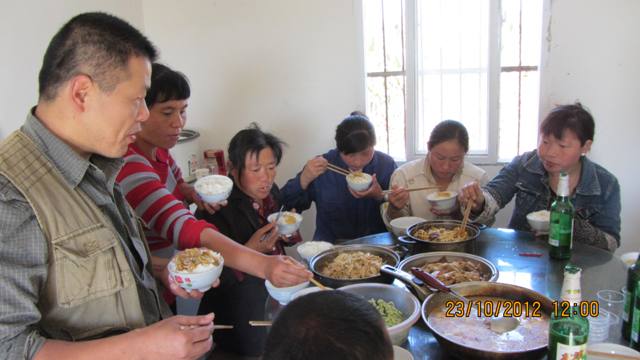Forced Abortions Persist in Rural China
Author: WRIC:Jing Zhang Translator: Tianqi BI Pulsihed Time: 11-03-2012
From October 20 to 26,2012 WRIC volunteers visited Ding Yuan in Chu Zhou,Anhui to investigate the enforcement of the PRC’s new pledge to stop their practice of forced abortion. Ding Yuan is the hometown of Li Keqiang, who is expected to be the Premier of the State Council of the People’s Republic of China. As WRIC volunteers passed through villages in China, villagers talked of this prospective Premier with enthusiasm. Discussions about politics in China are commonplace even in the villages. However, when it comes to the implementation of China’s one child policy, local and national authorities show no humanity. In July, along with six other working priorities on their list, China’s National Population and Family Planning Commission delivered a report calling for an end to late-term induced labor (abortion). All local government officials at the conference expressed their willingness to follow the spirit of the conference. However, one Party Branch Secretary from the PRC’s Basic Level told our WRIC’s volunteers that they never heard such a speech nor regulation.In that village, since June, three women have been forcibly aborted. Apparently, there is an unequal partnership between Local and Central Government making the PRC’s Central Government, with its focus on imposing top-down solutions, unaware that what is ordered by them is not carried out locally. If steps are not defined in the government’s priority area, the program will not be carried out properly or thoroughly. For example, although the PRC Constitution guarantees freedom of speech, the PRC’s government often harasses, arrests, and imprisons those independent scholars, netizens, and artists who are critical of the state system or government’s policies. China dissident and Nobel Peace Prize winner Liu Xiaobo remains locked up. Because the PRC’s Central government endorses, acquiesces, underplays and withholds the civil responsibility of those murders, they do not take the laws seriously. The situation is worse in China’s family planning system.
WRIC volunteer Yao Cheng interview rural women in Anhui China October 23, 2012 . (Photo by WRIC)
New Forced Abortion Tragedy in Shandong Province
The June 2012 forced abortion cases in Ankang, Shaanxi and Changsha, Hunan brought international condemnation by the US Congress and the European Parliament of the PRC’s inhumane One-Child Policy. In July, the Chairman of the Chinese National Family Planning Committee ordered moderation of the policy’s implementation. Sensational tragedies of forced abortions had abated somewhat as a result. Instead the emphasis had transferred to heavy fines on “illegal births” which include giving birth without a permit or assigned quota. On August 2, WRIC was informed of Xu Li, a six-months pregnant woman in Wuyi, Zhejiang who was jailed and threatened with forced abortion. Ms. Xu, who was carrying her second child, daringly escaped custody before borrowing 90,000 yuan from relatives to pay part of the 150,000 yuan “Social Welfare” fine. Ms. Xu told WRIC volunteers via phone that her whole family’s entire annual income fell well short of the 60,000 yuan fine which is still outstanding. On average, “Social Welfare Fees” are 6 to 10 times the family annual income of ordinary residents.
On October 2, officials kidnapped Ms. Song, from Qiaojia Village, Heilizhai Township of Zibo City, Shandong Province who was six months pregnant. Seven Family Planning agents took Ms. Song, who was at home alone around 5pm. She was driven over hundred kilometers to Dongying City’s Boai Women’s Hospital, a private-run for-profit business for an abortion. During this ordeal, Ms. Song was stripped by PRC Family Planning officials and bound with ropes. Her cell phone was confiscated. After she was sedated, Ms. Song was finger printed on the abortion consent form to give “consent.” After the procedure she was jailed inside her hospital room. At 11pm that night, Ms. Song’s family finally found her in Boai Hospital after the abortion, lying naked in the hospital bed.
Local Government Unaware of Central Government’s Tone
Qingshan Village in Dingyuan County is remote hill-and-valley country, where communication is difficult and transportation, not easy. More than a dozen residential groups occupy this village. Residential groups range from tens of families to several dozens. Most of the younger labor force works outside of the province as migrant workers. Mr. Li, the Village Party Chairman told WRIC volunteer that five babies were born in his residential group, one girl and four boys. Most young women from the village were working in the coastal Zhejiang Province, where private ultrasound clinics proliferated. If a baby girl was detected during the pregnancy, then she would be terminated through abortion. Strict enforcement of the PRC Family Planning Policy does not allow expectant women to check into hospitals outside of their home counties. Village officials try to persuade women carrying “illegal” pregnancies to leave. If the women are found out, Township officials will arrest them to force abortions on them. The PRC Family Planning Commission actually set up a reward system. A person who informed on a woman carrying a second child could receive a 500 yuan reward. Informing on a woman carrying a third child meant a 1000 yuan reward. “Illegal” extra-quota births would cost the Village Chairman and the PRC Family Planning official 50 yuan each (out of a 500 yuan monthly salary) plus additional punishments during promotions and yearly bonuses.

The WRIC’s volunteer(Left man) is having lunch with the women after interview.(Photo by WRIC)
Asked by WRIC volunteers about the PRC Central Government’s pronouncement forbidding forced abortions, Mr. Li said that he never knew of the decision nor any talk from higher levels of government. Li admitted that in the second half of 2012 alone, he participated in the arrest and force abortion of three women with “illegal” pregnancies.
Residency registration is one of the main venues of the PRC Family Planning Policy’s enforcement. “Illegal” children could not be registered. They could not enjoy social welfare or enter the public education system.
In relatively affluent Fanchang County, Anhui Province, kidnapping and forced abortions were relatively rare. Government propaganda enjoyed greater penetration. PRC Family Planning officials enjoyed richer benefits and rewards for detecting illegal pregnancies. Whenever suspicions fell on pregnant women and families, officials followed up closely. IUD implantation was mandatory after the first birth, forced sterilization after the second. Successful pregnancies of the third child were almost impossible. Illegal birth of the second child carried a fine of 100,000 yuan in Fanchang. Without paying the fine, the child could not be registered for citizenship, social benefits or schooling.
Minister Wang Xia Defines the Priority of Work: Keeping Birth Rate Low
On July 19 and 20, 2012, the PRC’s National Population and Family Planning Commission held its semi-annual work conference on national population and family planning work, and Minister Wang Xia delivered a report in which she highlighted six priorities of work. First, unswervingly adhere to the PRC basic National Policy of Family Planning, and effectively stabilize the low birth rate as the primary task; Second, information construction to comprehensively address population issues as a breakthrough and an important starting point; Third, gradually improve laws and legal system; Fourth, strengthen family planning public service system; Fifth, promote large scale family planning projects, and large investment; Six, continue to uphold and improve management responsibility. The core message and central theme of Wang Xia’s speech gave every policy practitioner “the emperor’s sword”—a symbol of special authorization that forced abortion is not regarded as crime. Even though Wang Xia stressed to put an end to late-term induced labor, PRC Family Planning workers know that it is impossible to keep a low birth rate without practicing birth control policy strictly. In fact, at beginning of the year, it launched a nationwide large-scale recruitment of Family Planning workers to secure the practice of the Family Planning policy and the low birth rate nationwide. In February of 2012, Bi Jie in Gui Zhou province recruited 4271 Family Planning workers, 18 to 30 years old and had college degrees.
Forced abortion and sterilization are similar in one way or another, but the consequences of exposing them and remaining silent are sometimes immensely different. Only a small number of women insist on filing lawsuits and appealing for their own reproductive rights against forced abortion, or even because of infection from the family planning surgeries; once their efforts are noticed by the society, local government will usually financially compensate them to some degree, as with the sensational case of Feng Jianmei in June of this year. Cao Ruyi, who was also almost forcibly aborted in June, attracted attention of US Congressman Chris Smith who subsequently sent a letter to enjoin relevant departments in Hunan to stop forced abortion on Cao’s 5 month-pregnancy. Cao hid herself with the help of WRIC volunteers until she delivered a healthy boy on October 15. She and her family expressed great appreciation to those who concerned about and supported her.
However, these lucky cases of Chinese women are rare while the majority of them can’t achieve their goal after a prolonged resistance. At 3:00am on October 20, 2012, resident of Sanhong Village, Longkou County, Honghu, Hubei, Zhang Wenfang, who was then petitioning as a victim of forced abortion in Beijing, was detained by policemen of Yangqiao police station of the Public Security Bureau of Fengtai District at the notorious “Jiu Jing Zhuang,” a private jail. She was not a suspect and did not even commit any crime, but all she got was an unprovoked deprivation of freedom instead of a solution to her hardship. This is of course not her first time of such suffering and is believed to be not the last if she insists on appealing. Nie Lina (Her photos of being forcibly dragged by several male officials at 6-month pregnancy have been posted widely on the Internet.), a very brave human right activist, was detained and kidnapped from her pregnancy to delivery to prevent her from petitioning in Beijing, thus harming the societal “harmony.” In October 2012, she was again detained by Beijing and Henan police force and her one-year-old child had to be jailed with her mother for several times. When the baby was 3 months old, she and her mother were put into a car in a jail in Beijing and then abandoned in the wilderness. On this freezing night, bearing great cold and hunger, Nie Lina and her daughter were finally saved. She would still try hard to hold back her tearing recounting the incident to Zhang Jing, Director of WRIC, on the phone. As of October 2012, the daughter of Nie Lina is the youngest detained petitioner in China on record.
Throughout the regions WRIC volunteers visited, the overwhelming impression was that the PRC Local Rural Family Planning authorities failed to receive or implement new policy directives. Old violent enforcement methods were still in practice. Women were still robbed of their rights to reproduction. Their sufferings from forced abortions and forced sterilizations continued. Their families faced astronomical fines levied by local governments.
Notably, more and more scholars are realizing that the major demographic problem in China is no longer population increase but low birth rate, population aging and gender imbalance. The October 26 2012 Report, Population Change and Adjustment in Population Policy, issued by the China Development Research Fund, collected opinions from more than 20 scholars. The report did not mention the Family Planning Policy’s human rights violations or the psychological suffering of the victims and their family. Neither did the researchers risk official suppression like long time intellectual opponents to the Family Planning Policy such as Yang Zhizhu. However, the Development Fund report was in stark contrast with National Family Planning Commission Chair Wang Xia’s talk in July of “Family Planning Policy as unshakable national policy”.

